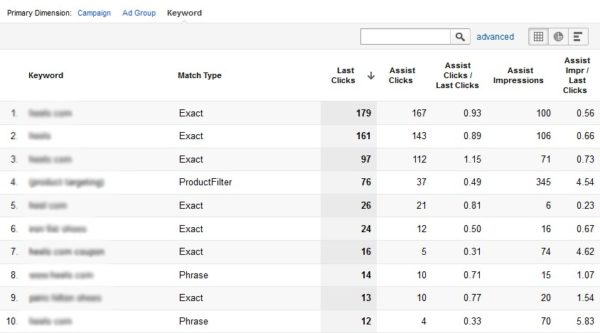Two Easy Ways To Leverage The Search Funnel
If you’ve read my previous post about Multi-Touch Attribution & Conversion: Does It Matter?, you should now be aware of whether or not it is worth digging into the conversion funnel by looking at the average lag from impression/click to conversion and, more importantly, the average number of impressions/clicks involved in a conversion. In other […]
If you’ve read my previous post about Multi-Touch Attribution & Conversion: Does It Matter?, you should now be aware of whether or not it is worth digging into the conversion funnel by looking at the average lag from impression/click to conversion and, more importantly, the average number of impressions/clicks involved in a conversion.
In other terms, now that you are most likely finding that a great percentage of your conversions occur after more than 1 just impression or click, let’s focus on your paid search program and define some simple action items based off a higher resolution consumer behavior analysis.
Identify & Leverage Top Assisting Keywords
You have certainly heard about “upper funnel keywords”. Those keywords are usually generic, non-branded, and play an essential role in your paid search program – and more generally in your online marketing efforts.
Upper funnel keywords assist other keywords in your program and don’t necessarily get the full credit for it, depending on how you look at the numbers and what platform you’re using.
In AdWords, those assisting keywords can be found in:
‘Tools & Analysis>Conversions>Search Funnels>Assist Clicks and Impressions’
You can then set the primary dimension to be ‘Keyword’ and sort the table by ‘Assist Clicks’.
Since assisting keywords are usually generic, they are high-traffic keywords. Since they are non-branded, you can most likely demonstrate that they tend to generate a high proportion of new customers vs. repeat customers – which basically means that the lifetime value (LTV) for those keywords is much greater. You might want to adjust your efficiency targets (CPA, ROAS, etc..) accordingly as a result.
Long story short, attributing the full credit to upper funnel keywords while baking the LTV component into it are two essential conditions to scale up your paid search program to the fullest.
In practice, you might want to:
• Set a separate bidding strategy for those top assisting keywords if the platform you’re currently using does not allow you to easily see the “true” revenue numbers.
Say you’re using AdWords – then you can identify top assisting keywords but you cannot set bid rules based off multiple touch points. You’ll have to analyze the data offline, then come up with some ideal bids which take into account consumer behavior. You might also want to simply target a certain rank to secure impression volume andboost customer acquisition on those competitive search queries.
• Apply a custom revenue attribution model (if the platform you’re using allows it) in order to display the “true” revenue numbers and make more informed decisions.
Pause Keywords Which Never Convert Nor Assist
As a matter of fact, some keywords never convert nor assist, they only generate ad cost. You definitely want to pause those; however, you might want to make sure the numbers you’re looking at are statistically significant.
For instance, you might consider that 100 clicks are required to be 95% confident that your results are significant, in which case you should:
- Pause those keywords which generated a statistically significant number of clicks, did not convert nor assist
- For low-volume keywords: Pause those ad groups which generated a statistically significant number of clicks, did not convert nor assist
Repeating this process on a regular basis (at least once a year if not more frequently) typically saves around 10% of your overall ad spend with zero impact on revenue.
While there is much more to say about how to leverage the search funnel to the fullest, these two simple tips are from my experience, a good starting point as they are quick to implement and pretty impactful.
Opinions expressed in this article are those of the guest author and not necessarily Search Engine Land. Staff authors are listed here.
Related stories
New on Search Engine Land
